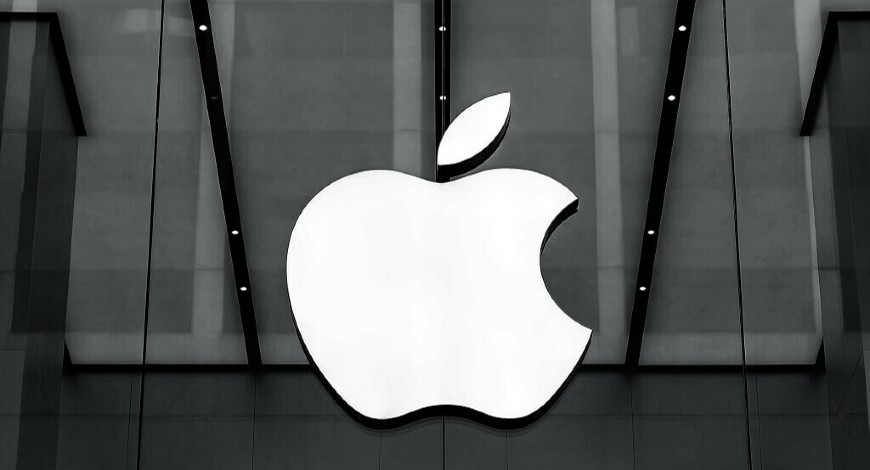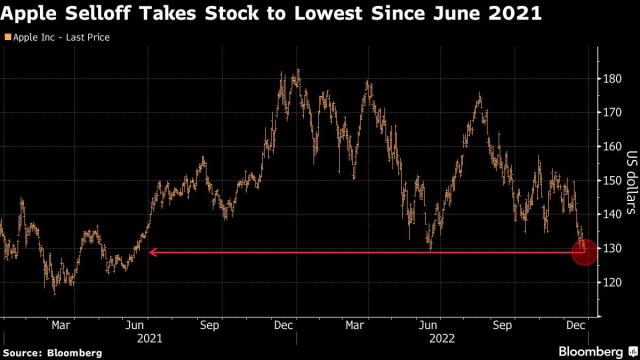Apple shares hit lowest level since June 2021 amid iPhone supply concerns.

Apple Inc. shares fell to their lowest level since June 2021 on Tuesday amid an ongoing selloff in large tech stocks fueled by concerns about iPhone supply during the crucial holiday shopping season.
The stock fell as much as 2.4% in what was set to be it’s third straight down day, but it quickly reversed course and was the last trading down 1.4% in New York at 10:45 a.m. Apple has lagged behind the performance of the tech-heavy Nasdaq 100 Index over the past month, despite a decline of 27%, which is less than the Nasdaq 100 Index’s 33% decline for 2022.
The recent weakness is due to a shortage of Apple’s flagship product as a result of production halts at a major iPhone plant in China. Despite the fact that Apple is “much further along in reaching parity between iPhone demand and supply” at this time of year, JPMorgan wrote earlier on Tuesday that iPhone supply is “improving and inching slowly towards parity with demand.” The company expects “muted” results for Apple’s December quarter as a result of this problem “in relation to general predictions.
According to JPMorgan analyst Samik Chatterjee, the most recent data on Chinese smartphone shipments “confirm industry headwinds.”
The Nasdaq 100 fell 0.8% on Tuesday, indicating a general decline in technology. Investors also expect the Federal Reserve to maintain its hawkish stance in the face of inflation, and the group is on track for its worst December performance since the dot-com era.
One analyst also maintains a bullish outlook on Apple.
Despite ongoing concerns about iPhone supply, shares of the tech giant have fallen to their lowest level since June 2021.
“Apple is the current biggest U.S. name out there, and we think it is a lot more headline risks than anything else,” said Angelo Zino, senior industry analyst at CFRA Research, on CNBC’s “Squawk Box Asia” on Wednesday.
A headline risk is a possibility that a company’s stock price will fall as a result of negative news coverage.

As a result of a widespread Covid outbreak in China as a result of the country’s decision to abandon its zero-Covid policy, Apple shares fell to their lowest level since June 2021, threatening iPhone production. The outbreak could result in a labour shortage at factories or component plants across the country.
Apple has already been dealing with production issues for the past two months. Covid-19 restrictions and labour unrest disrupted iPhone 14 production in November at its primary iPhone 14 Pro and iPhone 14 Pro Max assembly plant in Zhengzhou, China.
A JPMorgan Chase analyst predicted last week that the lack of supply would affect the normal seasonal uptick in volumes and would last until the end of the year. On November 6, just before the holiday season, Apple issued a “significant disruption” warning. “While the rapid extension of lead times for the iPhone 14 Pro/Pro Max has slowed and, in fact, begun to moderate in recent weeks,” Samik Chatterjee wrote in an investor note, “it still remains elevated relative to lead times seen prior to the COVID outbreak in Zhengzhou.”
Finally, Zino predicted that Apple would make every effort to protect its operations in various geographical areas for as long as possible.
He went on to say that the actual impact on the bottom line in the United States and Europe would be less than 1%.
Despite supply constraints, many analysts predicted that Apple customers would remain loyal to the company’s products.
Many consumers, according to Zino, are creatures of habit and will not necessarily stray from their previous behaviour within the Apple ecosystem.
Apple’s stock has dropped to its lowest level since June 20, 2021. Tesla’s stock has dropped 73% since reaching a record high in November 2021.
Businesses have found it difficult to maintain production in China due to COVID restrictions and weeks of lockdowns. China is currently facing a staffing shortage as it battles a Covid wave following the lifting of years of restrictions.
China’s announcement on January 8 that it will relax its strict travel quarantine regulations is welcome news for many investors who anticipate easier supply chain movement in 2023.

However, global investors are wary of further interest rate hikes, a slowing global economy, and the ongoing conflict in Ukraine. Given the increase in Covid cases in major manufacturing centres, analysts predict that it will take time for production to resume its upward trend.
According to Simon Baptist, chief economist at The Economist Intelligence Unit, factories will face labour shortages for at least 4-6 weeks as the wave passes through their production areas. Of course, the majority of migrant workers will return to their home villages at the end of January to celebrate the Lunar New Year.
It does not appear that normal production will resume in China until late February. Apple supplier Foxconn experienced production delays earlier this year due to unrest at its “iPhone City” plant in Zhangzhou. According to the company, revenue in November was down 11% from the same month in 2021.
According to media reports this week, Tesla’s Shanghai factory reduced production as Covid infections increased in China. The company chose not to comment.
Analysts, on the other hand, claim that the company’s poor sales are evidenced by the discounts it has provided to both Chinese and North American customers.
Investors are also concerned about Tesla CEO Elon Musk, who frequently makes bad headlines. Mr. Musk took control of Twitter in October after a protracted legal battle, and he has devoted a significant portion of his time to managing the social media network since then. Others have suggested that his alleged diversion during this time period is a factor in Tesla’s stock price decline.
Mr. Musk tweeted last week, asking users if they thought he should continue as CEO of the platform. When they said “no,” he announced that he would resign once a replacement was found.
According to analysts, he must now regain the trust of shareholders and board members. Webush tech analyst Dan Ives stated in his newsletter that Musk “is viewed as ‘asleep at the wheel’ from a leadership perspective for Tesla at a time when investors require a CEO to navigate this Category 5 storm.”
Instead, Musk is completely consumed by Twitter, which has proven to be a never-ending nightmare for investors. In the interview, he also mentioned that, despite challenges in the tech industry, Apple and Microsoft had held their own.
“Apple and Microsoft are two of the names that have held up the best, which makes sense,” Zino said.
“Because they have the most predictable free cash flow and are significantly less expensive than some of the other names out there,” the author explains.
Edited by Prakriti Arora





